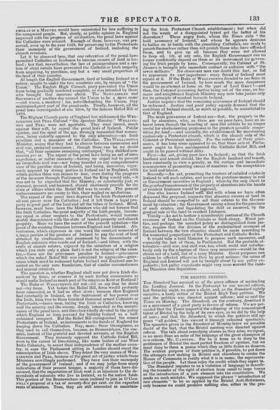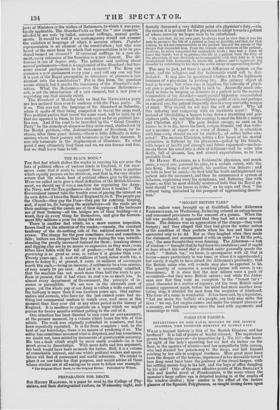THE BRISTOL PETITION.
THE Standard has accused us of the grave.offence of misleading the Leading Journal. In the Postscript to our second edition, last Saturday night, we gave a slight, and, as the Standard rightly surmises, a hasty notice of the Bristol High Tory petition. We said the petition was directed against reform ; and so said the Times on Monday. The Standard, on the contrary, described it as a movement of a great party in favour of reform. We are per- suaded that the Times inspected the offspring of the concentrated talent of Bristol by the help of its own eyes, as we did by the help of ours' and that the Standard, to which the petition still ap- pears "all golden," has viewed it through coloured spectacles. The speeches given in the Standard of Monday leave no possible doubt of the fact, that the Bristol meeting was directed against reform. The talk about remedying abuses as they arise, we repeat, is no more than an echo of the language of the great champion of non-reform, Mr. CANNING. Far be it from us to deny to the gentlemen of Bristol the most perfect freedom of opinion, hut we must deny to them a praise which they as little desire as deserve. The evident purpose of their petition is, if possible, to put down the attempts now making in Bristol and elsewhere to render the House of Commons in reality what it is in name, the representa- tive of the people: Let them enjoy the credit which they aspire to. The Standard imputes to.us a violation of language in describ-, ing the transfer of the right of election from small to large towns as the introduction of; a. new element into the-constitution. We made no such mistake.- We supposed the phrase "introduction of new elements" to be so applied by the Bristol Anti-Reformers, only because we could perceive nothing else, either in the pro- jects of Ministers or the wishes of Reformers, to which it was prac- tically applicable. The Standard tells us that the "new elements" alluded to are vote by ballot, universal suffrage, annual parlia- ments. It would be well if our contemporary would not commit the violation a language of which it accuses others. Popular rexesentation is an element of the constitution ; but who ever heard of the mere form by which that representation is to be pro- duced termed an element ? If universal suffrage be a new ele- ment, every extension of the franchise is a new element. The dif- ference is one of degree only. The petition said nothing about annual parliaments—that is a supplement of the Standard: but how came annual parliaments to be new elements ? The King can summon a new parliament every year ; and will any one say that it is part of the Royal prerogative to introduce at pleasure a new element into the constitution? Put in this form, the question seems absurd, but it marks the inaccuracy of the Standard's defi- nition. What the Reformers—even the extreme Reformers— ask, is not the introduction of a new element, but a new plan of regulating 'one that already exists. The Standard of Monday tells us that the NEWCASTLE party are less inclined than ever to coalesce with the PEEL party. Be it so. This was not the language of the Standard on Saturday, when it spoke of their being compelled to travel the same road. Two political parties that travel the same road, will be held, by all that are opposed to them, to have coalesced as far as political par- ties can. And if the road to be travelled by the " Great Country Party" be the remedy-of-abuses-as-they-arise-road, chalked out by the Bristol petition,—the disfranchisement of Evesham, for in- stance, 'after three years' debate,—there is little difficulty in deter- mining where their journey will terminate in the first instance. It can only terminate in the displacement of Ministers. To what point it may ultimately lead them and us, we can foresee and fear, but we shall leave time to tell.



























 Previous page
Previous page